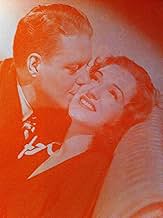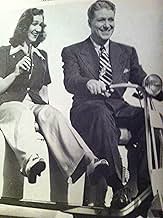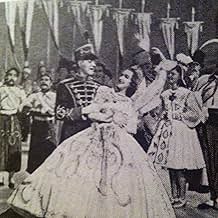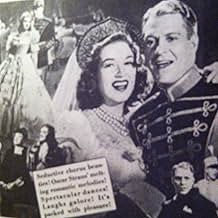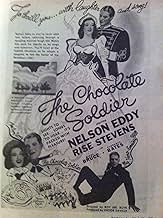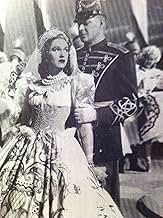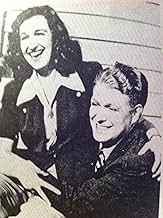Añade un argumento en tu idiomaMaria and Karl Lang are the singing duo of Vienna. Maria is very flirtatious and Karl very jealous. Karl decides to masquerade as a Russian guardsman and attempts to make Maria flirt with hi... Leer todoMaria and Karl Lang are the singing duo of Vienna. Maria is very flirtatious and Karl very jealous. Karl decides to masquerade as a Russian guardsman and attempts to make Maria flirt with him - to test her loyalty to him. As the Russian, Karl makes a vigorous attempt to seduce Ma... Leer todoMaria and Karl Lang are the singing duo of Vienna. Maria is very flirtatious and Karl very jealous. Karl decides to masquerade as a Russian guardsman and attempts to make Maria flirt with him - to test her loyalty to him. As the Russian, Karl makes a vigorous attempt to seduce Maria. For a moment she accepts then rejects him. Karl is left in turmoil.
- Dirección
- Guión
- Reparto principal
- Nominado para 3 premios Óscar
- 3 premios y 3 nominaciones en total
- Magda
- (as Dorothy Gilmore)
- Undetermined Secondary Role
- (sin acreditar)
- Singer - 'Seek the Spy' Sequence
- (sin acreditar)
- Emile, Voice Coach
- (sin acreditar)
- Waiter at the Double Eagle
- (sin acreditar)
- Messenger with Note
- (sin acreditar)
- Performer in Gypsy Café Sequence
- (sin acreditar)
- Stage Manager
- (sin acreditar)
- Flute Player
- (sin acreditar)
Reseñas destacadas
Both singers are in fine voice but it's Eddy who steals the show with his rendition of "Song of the Flea". Nelson Eddy was rarely praised for his acting prowess, but here he delivers a solid, sensational performance with great flair and dexterity. Absolutely his best work as an actor!
The pleasant supporting cast includes Nigel Bruce and Florence Bates.
Dreadful choreography in the musical numbers, but beautiful Oscar Strauss music performed masterfully by Eddy and Rise Stevens, plus `Evening Star' from TANNHAUSER sung gorgeously by Eddy and `My Heart at Thy Sweet Voice' from SAMSON AND DELILAH by Stevens. Even though Stevens has the superior voice, one can't help wishing that Jeanette MacDonald, with her considerable comic gifts, had been available for the part!
It takes a long time, but the music is beautiful, including "My Hero," "Mon coeur" from Samson and Delilah, "Evening Star" from Tannhauser (in English - I'm guessing in 1941, no one wanted to hear German), and many others. A friend of mine worked for Stevens, and she would occasionally comment that she was quite a looker in her day, to which my friend would reply, "Yeah, Miss Stevens, you were all right." She was a little more than that, at a time when opera singers who had true glamor was rarer than it is today.
Eddy and MacDonald were reteamed for one more film; the world had changed too much for their operatic fantasies. When Mario Lanza starred in films that used opera ten years later, he played, among other things, a truck driver and a soldier. It's too bad; Stevens and Eddy and MacDonald and Eddy both made beautiful teams.
¿Sabías que...?
- CuriosidadesThis has interesting origins from musical and non-musical plays. In 1909, the operetta "The Chocolate Soldier" opened in New York. This was based on the non-musical play "Arms and the Man" by George Bernard Shaw. However, Shaw voiced objections to his play being adapted as an operetta. A silent film adaptation, The Chocolate Soldier (1914), based on the New York operetta, omitted any reference to George Bernard Shaw. In 1911, a Hungarian non-musical play "Testör" ("The Guardsman") by Ferenc Molnár, opened in Budapest. In 1941 when this film was made, George Bernard Shaw was still alive. Therefore, the music of the New York operetta and the plot of the Hungarian non-musical play "The Guardsman" were used.
- PifiasWhen Eddy is impersonating a Russian singer, the nightclub impresario introduces him as a bass, but then Eddy sings. He is a baritone.
- ConexionesFeatured in We Must Have Music (1941)
- Banda sonoraMy Hero
(1909) (uncredited)
Music by Oscar Straus
Musical adaptation by Bronislau Kaper and Herbert Stothart (1941)
Original lyrics by Rudolph Bernauer and Leopold Jacobson
English lyrics by Hugh Stanislaus Stange (as Stanislaus Stange)
Additional lyrics by Gus Kahn (1941)
Sung by Risë Stevens and Nelson Eddy in the show
Hummed a cappella by Florence Bates
Sung by Risë Stevens in the Gypsy Café
Reprised by Risë Stevens and Nelson Eddy in the show at the end
Selecciones populares
Detalles
- Duración
- 1h 42min(102 min)
- Color
- Relación de aspecto
- 1.37 : 1

